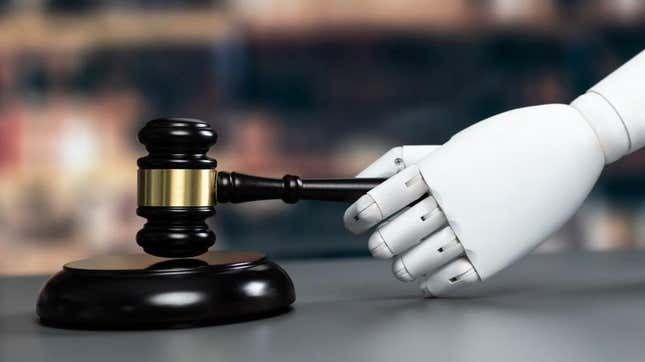
Robots may help determine your legal fate if you end up in a British court. The UK Judicial Office issued guidance Tuesday permitting judges to use ChatGPT and other AI tools to write legal rulings and perform several other tasks.
“The use of Artificial Intelligence (‘AI’) throughout society continues to increase, and so does its relevance to the court and tribunal system,” the Judicial Office, which oversees judges, magistrates, and members of tribunal panels in England and Wales, said in a statement. “The guidance is the first step in a proposed suite of future work to support the judiciary in their interactions with AI.”
It’s a shift that may come as a surprise to anyone who’s been paying attention to AI’s stumbling introduction to our various legal systems. Earlier this year, two lawyers in New York were fined $5,000 after they submitted legal documents written by ChatGPT, in which the AI made up several imaginary quotes and citations. In October, convicted Fugees rapper Prakazrel “Pras” Michél said his former lawyer bungled his trial with a closing argument written by AI.
But stories about the potential dangers of AI haven’t stopped lawyers and other officials from diving headfirst into the technology.
That’s especially true in the UK, where judges seem excited about the tech. In September, Lord Justice Birss of the Court of Appeal of England and Wales used ChatGPT to summarize legal theories he was unfamiliar with and copied and pasted the results into an official ruling. Birss called the AI a “jolly useful” tool.
The guidance clears the path for British judges to experiment with the technology, though the Judicial Office did suggest some limits on AI, acknowledging its potential pitfalls.
The Judiciary noted that AI responses “may be inaccurate, incomplete, misleading, or biased,” and suggested that ChatGPT and other large language models “are a poor way of conducting research to find new information you cannot verify.” The guidance also recommended that judges check the accuracy of AI responses before they, you know, make rulings that will alter the course of people’s lives. A jolly good idea indeed.
The guidance also warns against privacy concerns, pointing out that AI companies harvest the results of user interactions. The Judicial Office said judges should assume that typing something into a chatbot interface is the same as publishing it for all the world to see.
Overall, the 6 pages of guidance provide such basic details about the technology it’s clear the Judiciary assumes some judges have zero understanding of artificial intelligence. Given the astronomical stakes, you have to wonder whether it’s a good idea to let judges go wild with AI with less than 2,000 words worth of gentle recommendations steering their new robotic gavels.